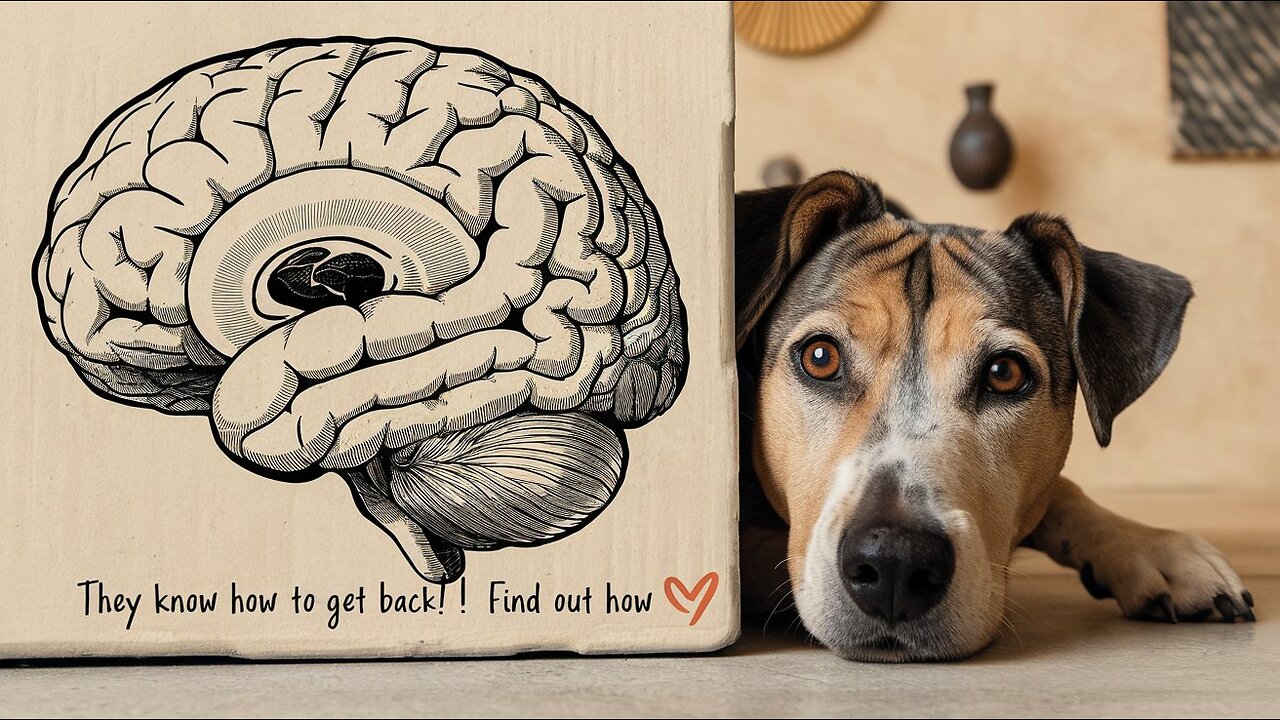Premium Only Content

Science Explains How Lost Dogs Find Their Way Home.
Science Explains How Lost Dogs Find Their Way Home.
Have you ever heard stories of dogs who, even miles away, can find their way back home? This phenomenon, which seems almost magical, is actually the result of impressive abilities that science is beginning to unravel.
Smell as the Main Guide
A dog's sense of smell is, without a doubt, one of the most powerful tools they have for finding their way around. While humans have around 5 million olfactory receptors, dogs can have up to 300 million, depending on the breed. This incredible sensitivity allows them to detect odors from great distances and even follow trails left days ago.
When a dog gets lost, he can use the characteristic smell of his home, his guardians or other familiar places to trace his way back. Studies show that dogs can distinguish specific odors among thousands of others, which is essential for their orientation.
A “Biological GPS”
In addition to their sense of smell, dogs also have a fascinating ability: magnetoreception. Recent research suggests that dogs are able to detect the Earth’s magnetic field, acting as a “biological GPS.” This helps them stay on the right track even in unfamiliar territory or without visual landmarks.
An experiment conducted in the Czech Republic observed dogs released into the forest and analyzed how they returned to their starting point. The researchers noticed that many of them use a technique called “search run,” where they run in a straight line for a few meters, apparently calibrating their orientation to the Earth’s magnetic field before returning to the right path.
Memory and Pattern Recognition
Spatial memory also plays a crucial role. Dogs are excellent at recognizing patterns in the environment, such as landscapes, streets or smells. If they have visited certain places before, they can associate these landmarks with the way home.
In addition, dogs form deep emotional bonds with their owners and their home, which can act as an extra motivation for them to persevere in their search for the return.
The Role of Training and Socialization
It is important to note that trained and well-socialized dogs are more likely to find their way back. They develop more effective navigation skills and cope better with unfamiliar situations. On the other hand, dogs that live in confined areas or without external stimuli may have more difficulty finding their way.
How to Help a Lost Dog?
Although dogs have these impressive abilities, it is essential to take preventive measures to prevent them from getting lost. Always keep your pet on a collar and with identification, and consider using a microchip. If your pet does get lost, spreading objects with your scent (such as clothing) around can help you locate your home.
Science continues to unravel the mysteries behind dogs' abilities, but one thing is certain: they have an extraordinary set of senses and instincts that make them true explorers in search of their way back home.
The Survival Instinct
In addition to their natural abilities, dogs' survival instinct also plays an important role when they are lost. They have an innate ability to adapt to adverse situations, whether it be finding shelter, water or food. This instinct can help them resist the time it takes to find their way home or until they are located by their owners.
Researchers believe that the emotional bond with their owners can amplify the dog's determination to return. This emotional bond, combined with memory and heightened senses, creates a powerful combination that increases the chances of a successful return journey.
Incredible Stories of Returning Home
There are countless stories around the world of dogs who have traveled hundreds of kilometers to return home. One famous case is that of Bobbie, the Wonder Dog, who in 1923 traveled more than 4,000 kilometers from the state of Indiana to Oregon, in the United States, to be reunited with his family. The most impressive thing is that he made this journey in six months, crossing difficult terrain and facing extreme climates.
Another well-known example is that of a dog named Max, who got lost during a family trip in the interior of Brazil. After weeks of being missing, he was found on his doorstep, visibly tired but healthy. Stories like these show that dogs are capable of overcoming incredible challenges thanks to their resilience and natural abilities.
What More Can Science Discover?
Although we already know many aspects of dogs' ability to navigate, there is still much to be studied. Future research could explore in more depth how the Earth's magnetic field influences dogs' behavior or how genetics can affect their navigational abilities.
In addition, better understanding these mechanisms can help develop technologies or methods for locating lost dogs, such as devices that rely on their natural senses.
The Connection Between Humans and Dogs
Ultimately, the return of a lost dog is not only a demonstration of their abilities, but also a reflection of the unique bond between humans and dogs. This relationship, built over thousands of years of domestication, creates a connection so deep that many owners report “feeling” that their dogs are trying to find their way home.
So science helps us understand how these true furry heroes are able to perform such impressive feats, but it also reminds us of something fundamental: the love and loyalty that binds dogs and humans are powerful forces that transcend science.
If you have a dog, cherish this special relationship and take steps to protect it. After all, even with all these incredible abilities, the best place for a dog is with the one he loves.
The Importance of Prevention
Despite the extraordinary abilities of dogs, it is essential that owners take steps to prevent them from getting lost. Prevention is always the best way, and some simple practices can make a difference:
Up-to-date identification: Make sure your dog has a collar with an identification tag with your name and a contact phone number. This greatly increases the chances that he will be returned quickly if he is found by someone.
Microchip: The microchip is a safe and effective technology. It works as an "electronic ID" for the dog and can be read by veterinarians or shelters, allowing the owner to be located.
Obedience Training: Teaching basic commands, such as "come" or "stay", can be crucial in risky situations. A dog that responds well to these commands is less likely to stray.
Supervision During Walks: Always keep your dog on a leash during walks, especially in unfamiliar or busy areas. This prevents him from getting scared and running away if something unexpected happens.
Secure Fences and Gates: Make sure the yard or garden is well fenced, with no gaps through which the dog can escape.
How to React If Your Dog Gets Lost
If, despite your care, your dog gets lost, it is important to act quickly:
Spread the Word: Share photos and information about the dog on social media and in local groups that help lost animals. The more people who know about the disappearance, the greater the chances of finding the dog.
Visit Shelters and Veterinary Clinics: Often, lost dogs are taken to shelters or clinics by people who find them. Make regular visits and leave your contact details at these locations.
Use Your Dog's Sense of Smell to Your Advantage: Leave objects with the owner's or home's scent in strategic locations, such as the front door or places where the dog was last seen. This can help the dog find its way back.
Search During Quiet Times: Lost dogs may hide in quiet places out of fear. Searching at night or early in the morning, when there is less movement, can increase the chances of finding the dog. A Happy Ending
Stories of reunions between lost dogs and their owners are always moving and reinforce the strength of the bond between humans and animals. Knowing that science is helping to better understand the incredible capabilities of dogs is encouraging, but it also highlights the responsibility we have as owners.
By taking good care of your dog and ensuring his safety, you not only prevent risky situations, but you also strengthen the trust and love he feels for you. After all, for your dog, you are much more than just an owner; you are the center of his world.
Let's take care of our four-legged friends, because they would undoubtedly do anything to come home and be by our side.
-
 16:12
16:12
T-SPLY
15 hours agoJeff Bezos Is Now Enemy #1 For The Trump Administration
122K91 -
 12:24
12:24
Tundra Tactical
8 hours ago $6.34 earnedThe SIG Roast to ND Them All
68.7K8 -
 1:02:31
1:02:31
BonginoReport
11 hours agoDeportations Keep “Frightened” Michelle Obama Awake at Night (Ep. 37) - Nightly Scroll with Hayley
159K196 -
 1:54:29
1:54:29
Adam Does Movies
2 days ago $3.30 earnedTalking Movie News & Just Chatting About Films - LIVE!
51.4K3 -
 1:02:51
1:02:51
Anthony Rogers
1 day agoEpisode 364 - JFK FILES
27.7K2 -
 1:41:02
1:41:02
megimu32
7 hours agoON THE SUBJECT: 1 Million Views Party! Diddy Drama, Marvel Weirdness, and Total Prom Chaos
37.7K16 -
 1:18:44
1:18:44
Kim Iversen
10 hours agoMagnetic Pole Shift: Europe’s Blackout Is Just the Beginning | 90° Earth Flip Coming
120K300 -
 2:44:58
2:44:58
Laura Loomer
9 hours agoEP118: LIVE COVERAGE: Trump Celebrates 100 Days In Office At Michigan Rally
79K38 -
 3:40:42
3:40:42
Barry Cunningham
16 hours agoWATCH TRUMP RALLY LIVE: PRESIDENT TRUMP MARKS 100 DAYS IN OFFICE WITH A RALLY IN MICHIGAN
57.7K23 -
 1:32:44
1:32:44
Badlands Media
16 hours agoBadlands Media Special Coverage: President Trump's 1st 100 Days Rally
68.9K4